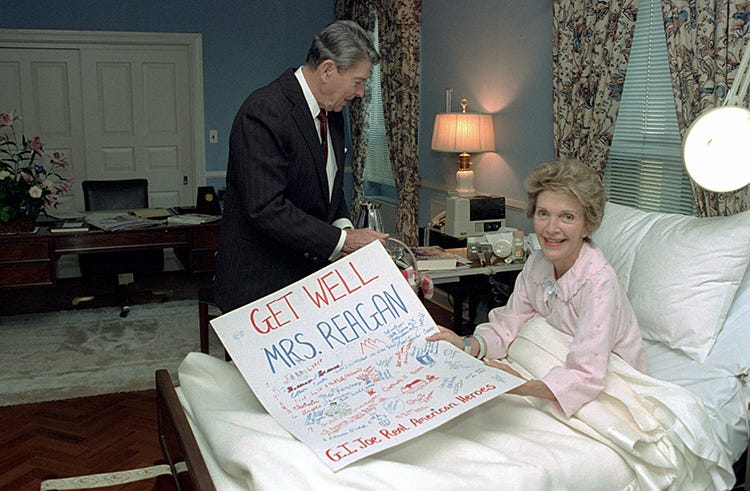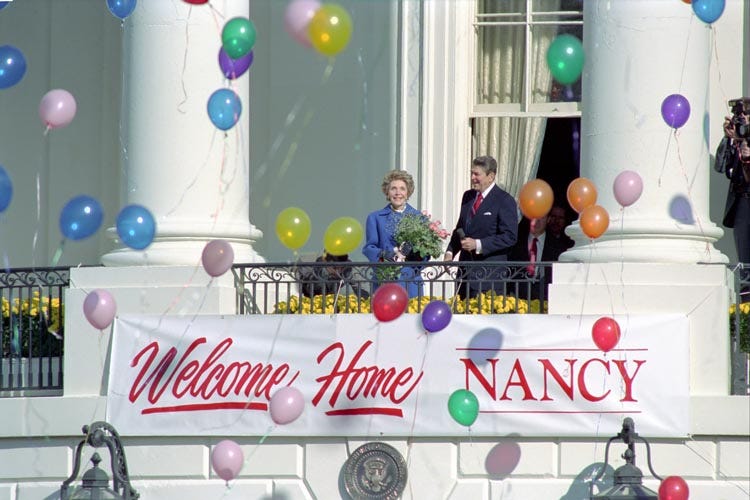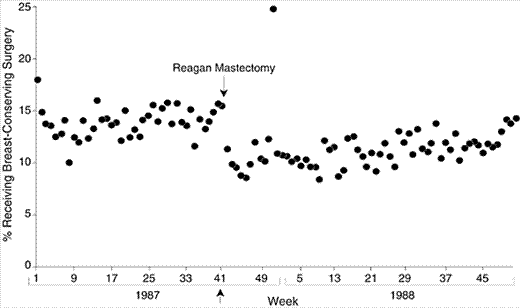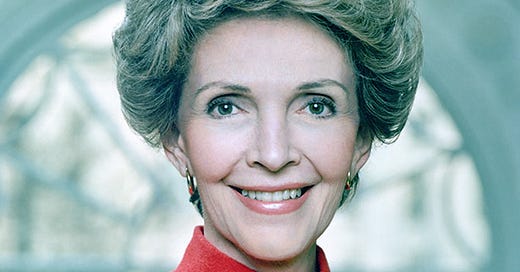First Lady Nancy Reagan underwent a routine, screening mammogram on October 5, 1987, which revealed a small mass. With her husband amid Robert Bork’s controversial Supreme Court nomination and a planned State Visit from the Crown Prince and Princess of Japan, the Reagans kept her diagnosis quiet and scheduled her surgery a few weeks later.
Despite early detection and knowing that recent data supported her choice to preserve her breast with a lumpectomy, Mrs. Reagan decided to undergo a modified radical mastectomy. She also decided against having a biopsy first, opting for a “single stage” procedure where biopsy and surgery were performed at the same time.
Essentially, neither she nor the surgeons knew for SURE she had cancer when she was rolled into the operating room; a situation which is very rare now and unusual even back then. The “double stage” process where a biopsy is performed as an outpatient and then surgery scheduled a week or so later when cancer is confirmed, was firmly established as standard of care in the early 1980s.
So, Nancy Reagan underwent a modified radical mastectomy on October 17, 1988.

She remarked to her husband after her surgery, “They took my breast. I feel sorry for you.” President Reagan, brushing aside her concerns, joked, “That’s all right, honey. I’ve always been a leg man myself.”
Thirty-six thousand letters poured into her hospital room at Walter Reed along with well wishes and flowers from around the world, including calls from Mrs. Ford and Mrs. Rockefeller, both breast cancer survivors themselves. She spent less than a week in the hospital and since her tumor was small, she required no further treatment. In Mrs. Reagan’s mind, the whole matter was behind her.

Prominent physicians and women’s groups across the country, however, bemoaned her decision to undergo a mastectomy. Op-Ed pieces criticizing her surgical choice appeared in newspapers across the country. The criticism was so powerful that it sparked a media frenzy with newspaper headlines declaring “Mastectomy Seen as Extreme for Small Tumor.” Prominent breast cancer advocate Rose Kushner declared that Mrs. Reagan’s decision to undergo a mastectomy without a biopsy had “set us back 10 years.”
Forced to defend her decision, Mrs. Reagan finally appeared on ABC News’ 20/20 in 1988. There she stated plainly her reasons for choosing a mastectomy: “I couldn’t possibly lead the kind of life I lead, and keep the schedule that I do, having radiation or chemotherapy. There’d be no way,”
Her message was simple, “The important thing is that every woman should have an annual mammogram. That's the message I want to get out. What they decide after that, if they find a problem, is up to each individual woman.” Sounds a lot like personal choice over health care decisions…
“What they decide after that, if they find a problem, is up to each individual woman.”
Like the public response to Betty Ford’s breast cancer diagnosis, mammography centers across the country were overwhelmed with calls. Women in America were watching and listening. Analysis of population data from that time, however, supports the fears of her critics.
A review of breast surgeries in America following Mrs. Reagan’s diagnosis showed that the rate of lumpectomy dropped 25%, most notably in Southern white women with lower levels of income and education. After Mrs. Reagan’s surgery, these women began to also choose mastectomies in a dramatic way. The effect, however, was transient and the rate of lumpectomies returned to normal within a year.

What this data and the public outcry show is that rather than solidarity, now there were opinions about the First Lady’s obligation to align her personal medical choices with the scientific community messaging. Breast cancer advocates had been fighting for years to given women time to consider their surgical options once diagnosed with breast cancer. AND to choose a lumpectomy which preserved the breast rather than a mastectomy. I mean get on message, Nancy!
The one-stage approach eliminated the time for women to explore options for more conservative surgeries. Further, it was not uncommon for a woman to undergo a radical mastectomy based on the intra-operative findings, only to find out on final read that her breast lump had in fact been benign.
Time between biopsy and surgery also allowed staging studies to determine whether cancer had spread or metastasized. It was estimated that over 11,000 women a year were undergoing unnecessary mastectomies because at the time of surgery, their cancer had already spread outside the breast. Finally, decoupling biopsy and surgery would allow women to seek enrollment in clinical trials.

Separating biopsy and surgery gave women time to make choices. Rather than “getting it all over at once,” women could gather information. Surgeons resisted, however, viewing the one-step approach as kinder by not dragging out the anxiety and worry over weeks. The one stage procedure coincidentally also simplified surgeon’s operating room schedules, reduced those annoying questions from patients, and maximized insurance reimbursement. Hmm…
Nancy Reagan chose a single stage mastectomy, encouraged other women to get their screening mammograms and make the choice that was right for them. As I think about messaging around breast cancer, I think about Mrs. Reagan and my other patients who make the best decision they can for their cancer and then fend off criticisms about what they “should” have done.
Or the doctor they should have seen.
Or the second opinion they should have sought.
In the quiet moment when she tells me her decision, I often tell a patient that the only woman she must please is one staring back in the mirror.
And that she should be kind to the woman in the mirror. She made the best decision she could with the information she had.
If you want to find out more about First Ladies and Breast Cancer you can listen to an entire podcast, I recorded on the Cancer History Project.
On my mind…
It’s hard to believe that 2 cancer related books (The Fault in Our Stars and The Basketball Diaries) made it to the banned books list but here we are. I highly recommend both.
I’m thrilled that our experience in developing a survivorship program for lung cancer survivors has been accepted for presentation at the Multi-Disciplinary Thoracic Cancer Symposium in New Orleans. Any recommendations while I’m in The Big Easy?
After many tearful days, I have finally found a mascara that stands the test of time. Thrive Liquid Lash Extensions is worth every penny. They advertise heavily on podcasts so there is a discount code if you search. (No sponsors just an awesome product.)







I'd heard about her breast cancer diagnosis but had no idea about this aftershock of increased radical mastectomies in the public! Great exploration of the delta behind what is recommended and how that might not always match what is "right" for an individual patient.
Similarly, when I was in practice as a vet, I had to remind myself that everyone has a unique relationship with their animals and may value them differently; just because they wouldn't opt for the same care I would doesn't mean they don't love their pet too
Thanks for sharing such a medical-historical event. You are doing great work, Stacy!